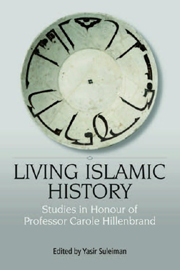Book contents
- Frontmatter
- Contents
- Acknowledgements
- Professor Carole Hillenbrand: List of Publications
- Preface
- 1 The Origin of Key Shi‘ite Thought Patterns in Islamic History
- 2 Additions to The New Islamic Dynasties
- 3 Al-Tha‘alibi's Adab al-muluk, a Local Mirror for Princes
- 4 Religious Identity, Dissimulation and Assimilation: the Ismaili Experience
- 5 Saladin's Pious Foundations in Damascus: Some New Hypotheses
- 6 The Coming of Islam to Bukhara
- 7 A Barmecide Feast: the Downfall of the Barmakids in Popular Imagination
- 8 The History of the Patriarchs of the Egyptian Church as a Source for the History of the Seljuks of Anatolia
- 9 Genealogy and Exemplary Rulership in the Tarikh-i Chingiz Khan
- 10 Vikings and Rus in Arabic Sources
- 11 Qashani and Rashid al-Din on the Seljuqs of Iran
- 12 Exile and Return: Diasporas of the Secular and Sacred Mind
- 13 Clerical Perceptions of Sufi Practices in Late Seventeenth-Century Persia, II: Al-Hurr al-‘Amili (d. 1693) and the Debate on the Permissibility of Ghina
- 14 On Sunni Sectarianism
- 15 The Violence of the Abbasid Revolution
- 16 Nationalist Poetry, Conflict and Meta-linguistic Discourse
- Bibliography
- List of Contributors
- Index
3 - Al-Tha‘alibi's Adab al-muluk, a Local Mirror for Princes
Published online by Cambridge University Press: 12 September 2012
- Frontmatter
- Contents
- Acknowledgements
- Professor Carole Hillenbrand: List of Publications
- Preface
- 1 The Origin of Key Shi‘ite Thought Patterns in Islamic History
- 2 Additions to The New Islamic Dynasties
- 3 Al-Tha‘alibi's Adab al-muluk, a Local Mirror for Princes
- 4 Religious Identity, Dissimulation and Assimilation: the Ismaili Experience
- 5 Saladin's Pious Foundations in Damascus: Some New Hypotheses
- 6 The Coming of Islam to Bukhara
- 7 A Barmecide Feast: the Downfall of the Barmakids in Popular Imagination
- 8 The History of the Patriarchs of the Egyptian Church as a Source for the History of the Seljuks of Anatolia
- 9 Genealogy and Exemplary Rulership in the Tarikh-i Chingiz Khan
- 10 Vikings and Rus in Arabic Sources
- 11 Qashani and Rashid al-Din on the Seljuqs of Iran
- 12 Exile and Return: Diasporas of the Secular and Sacred Mind
- 13 Clerical Perceptions of Sufi Practices in Late Seventeenth-Century Persia, II: Al-Hurr al-‘Amili (d. 1693) and the Debate on the Permissibility of Ghina
- 14 On Sunni Sectarianism
- 15 The Violence of the Abbasid Revolution
- 16 Nationalist Poetry, Conflict and Meta-linguistic Discourse
- Bibliography
- List of Contributors
- Index
Summary
Most Islamic mirrors for princes rest not on projected Utopias but on examples from the past. They draw upon a fund of wisdom attributed to ancient Greek and Persian as well as Muslim sages, and for all their differences of format, their guiding precepts are often expressed in ‘strikingly similar terms’. Yet, as Louise Marlow concludes, in the most recent and wide-ranging survey of Islamic advice literature:
[Although] certain themes of advice literature have endured since antiquity in diverse cultural milieux … each example is strikingly individual, tailored to specific circumstances and specific writer-ruler relationships. The significance of a motif, however often it has been invoked before, is shaped with each utterance by the particularities of time, place, author, and audience. Consequently, works of advice literature resonate on several levels: they evoke and participate in a longstanding literary, cultural, and political continuum, and they carry immediate and specific meanings and implications (2007: 55).
Relevance to specific circumstances applies regardless of the language of composition of a piece of advice literature and of the linguistic politics surrounding it, which are not always easy to interpret. Thus Arabic was the Islamic language which first received the freight of ancient wisdom from the peoples conquered in the first/seventh century, and this freight passed back to, and was shared with, Persian, when the latter re-emerged as a language of high culture in the fourth/ tenth century.
- Type
- Chapter
- Information
- Living Islamic HistoryStudies in Honour of Professor Carole Hillenbrand, pp. 32 - 46Publisher: Edinburgh University PressPrint publication year: 2010

